
Viking Names
Snitterby
Snitterby, in the Aslacoe Wapentake of Lincolnshire, is an Anglo-Scandinavian hybrid from the Old English unrecorded male personal name Snytra and Old Norse by ‘a farmstead, a village’. It is suggested that the personal name comes from Old English snotor, snytre ‘wise’. The same personal name has been attributed also to Snetterton, Norfolk.
Read More

Viking Names
Tealby
Tealby, in the Walshcroft Wapentake of Lincolnshire, is a very difficult name. To explain the earliest recorded forms Tavelesbi and Tauelesbi in Domesday Book, it has been suggested that the first element contains the East Germanic group-name Taifali, Old English Taflas /Taeflas, detachments of whom are recorded as early as the fifth century. Possibly, this group retained their separate identity for some time in the post-Roman period. Thus, Tealby would originally have been a simplex form of the group-names Taflas /Taeflas, although simplex group-names are rare in English place-names. The second element Old Norse bý ‘a farmstead, a village’ was likely added to the simplex form after Scandinavian occupation of the area.
Read More

Viking Names
Car Colston
The first element of Colston, in the Bingham Wapentake of Nottinghamshire, is probably the Old Norse male personal name Kolr combined with the Old English element tun ‘an enclosure; a farmstead; a village; an estate’. Thus it is an Anglo-Scandinavian hybrid name. The later prefix Car was added to distinguish this from Colston Bassett. Early spellings suggest that this developed from Old Norse kirkja, ‘church’, in its Middle English form kirk(e). Later this was undoubtedly confused with the word carr (Middle English ker), ‘marshland’, common in Nottinghamshire place-names.
Read More

Viking Names
Thorwif
Þorwīf is a postulated Anglo-Scandinavian hybrid name formed from the Old Norse element Þor– from the god Þórr ‘Thor‘ combined with the Old English element wīf ‘woman, wife’. Forms of Þorwīf are attested in medieval Yorkshire charters.
Read More
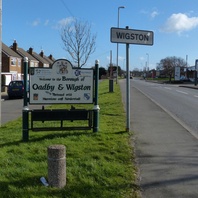
Viking Names
Wigston Magna
Wigston Magna, in the Guthlaxton Hundred of Leicestershire, is an Anglo-Scandinavian hybrid from the Old Norse male personal name Víkingr and the Old English element tun ‘an enclosure; a farmstead; a village; an estate’. Alternatively the first element might be the Old Norse appellative víkingr ‘a viking’, the probably source of the personal name. It has also been suggested that the first element may be the Old English male personal name Wicing or Old English wicing ‘a pirate, a viking’; however, these suggestions are doubtful because the length of the initial vowels of these elements are uncertain, therefore, the Old Norse male personal name is generally accepted as the first element. The Medieval Latin affix Magna ‘big, great’ arose when there was confusion between forms from Wigston Magna and Wigston Parva, which have different etymologies and development, around the the sixteenth century. Some forms of the name also have the affix with two steples because Wigston Magna possessed two medieval churches. Wigston Magna is also known as Wigston and is a joint parish with Oadby.
Read More
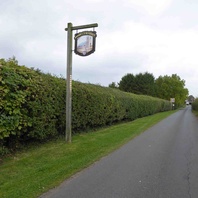
Viking Names
Fenby
Fenby, in the Haverstoe Wapentake of Lincolnshire, is an Anglo-Scandinavian hybrid from Old English fenn ‘a fen, a marsh, marshland’ and Old Norse by ‘a farmstead, a village’. It is most likely to be a partial Scandinavianization of an earlier Old English place-name, perhaps Fenton, with a similar meaning. Fenby is now a joint parish with Ashby, and the name survives in Fenby Farm, which lies in what must have been a fenny area on the lower slope of the Wolds.
Read More

Viking Names
Kirton
Kirton, in the Bassetlaw Wapentake of Nottinghamshire, is a hybrid name, a compound of Old Norse kirkja ‘a church’ and Old English tun ‘ an enclosure; a farmstead; a village; an estate’.
Read More

Viking Names
Wigtoft
Wigtoft, in the Kirton (in Holland) Wapentake of Lincolnshire, is likely an Anglo-Scandinavian compound. The first element is uncertain, but it is probably Old Norse vík ‘a small creek, an inlet, a bay’. The second element is Old English toft ‘a curtilage, the plot of ground in which a dwelling stands’. Wigtoft is situated near Bicker Haven, which was formerly an arm of the sea.
Read More
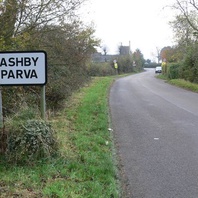
Viking Names
Ashby Parva
Ashby Parva, in the Guthlaxton Hundred of Leicestershire, is an Anglo-Scandinavian hybrid from Old English æsc ‘ash-tree’ and Old Norse by ‘a farmstead, a village’. There may have also been possible influence on the first element from Old Norse eski ‘a place growing with ash-tree’ or Old English esce ‘a stand of ash-trees’. Affixes such as the Medieval Latin parva ‘small’ and Middle English litel ‘little’ were variously added to different forms of the name to avoid confusion with nearby Ashby Magna.
Read More
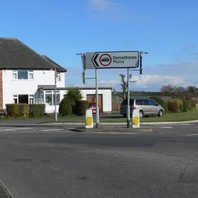
Viking Names
Donisthorpe
Donisthorpe, historically belonging to the Repton and Gresley Hundred of Derbyshire, comes from the Norman male personal name Durand (Middle English genitive singular Durandes) and the Old Norse element þorp ‘outlying farm, settlement’. Place-names containing þorp are thought to be later names, or at least rather longer lived, than those containing the Old Norse element by ‘farm, settlement’ because there are more instances of post-Conquest-type elements combined with þorp than by. Donisthorpe is an example of one of these place-names. Donisthorpe is a joint parish with Oakthorpe and they were both transferred to Leicestershire in 1897. These place-names are close in proximity to Boothorpe and Osgathorpe in Leicestershire demonstrating the density of the Old Norse element þorp across the medieval and modern landscape.
Read More
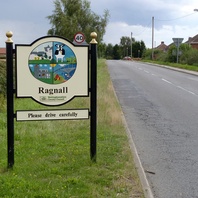
Viking Names
Ragnall
Ragnall, in the Bassetlaw Wapentake of Nottinghamshire, is a hybrid name formed from the Old Norse male personal name Ragni and the Old English element hyll ‘a hill, a natural eminence or elevated piece of ground’.
